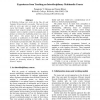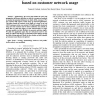93 search results - page 9 / 19 » Core empirical concepts and skills for computer science |
ACSE
2000
ACM
13 years 11 months ago
2000
ACM
The University of Queensland has recently established a new design-focused, studio-based IT degree at a new “flexible-learning” campus. The Bachelor of Information Environment...
ICMCS
1999
IEEE
13 years 11 months ago
1999
IEEE
At Wellesley College very rarely do the Fine Art and Computer Science faculty cross paths. That was the case until two years ago when we taught an experimental course that brought...
CHI
2007
ACM
14 years 7 months ago
2007
ACM
Middle and high-school science teachers have traditionally introduced current events in the classroom to leverage news topics relevant to the curriculum, such as the Sumatra Tsuna...
SECURWARE
2008
IEEE
14 years 1 months ago
2008
IEEE
— Epidemiology, the science that studies the cause and propagation of diseases, provides us with the concepts and methods to analyze the potential risk factors to which ADSL cust...
HICSS
2006
IEEE
14 years 1 months ago
2006
IEEE
Bandura’s theories of self- and collective efficacy are widely recognized in many fields, including psychology and management, but have been largely unnoticed by the Human-Compu...


